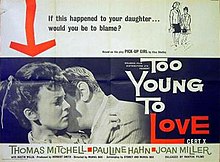|
Too Young to Love (film)
Too Young to Love is a 1959 British drama film set in New York. It was directed by Muriel Box and starring Pauline Hahn, Joan Miller, and Austin Willis.[1][2] It was based on the play Pickup Girl by Elsa Shelley.[3] An adaptation of the story was broadcast on British TV on 6 December 1957 in the ITV Television Playhouse series. PlotIn New York, a policeman and a neighbour watch as a middle-aged man and a young man enter a house where a young girl can be seen getting ready for bed. After the young man leaves, the policeman enters the house to make an arrest. In a juvenile court hearing, it emerges that the 15-year-old Elizabeth has been found in a compromising position in her bedroom with a 47-year-old man, Mr Elliot. Elizabeth is one of four children in a struggling working-class family, her mother a hard-working cook, her father ran into debt while he was unemployed and found a job working in California. In the evenings, at the home of an older girl Ruby Lockwood, teenagers have frequent dance and necking parties, sometimes attended by older men. Eventually, Elizabeth recounts her story (in flashback) before the judge. Elizabeth's life is grim and joyless, and she has been neglected after the constant absence and lack of guidance from her parents. Led astray by Ruby, she has sex with a sailor and has an abortion. The judge is sympathetic, but a report sent to the judge puts Elizabeth's fate in the balance. Cast
ReceptionTV Guide wrote, "Mitchell does all he can to keep this picture from failing, but it's not enough ... this is hurt mainly by its excess of courtroom scenes."[4] Monthly Film Bulletin said "Apart from being pointlessly toned down, Elsa Shelley's old club theatre success has been adapted to the screen with depressingly unimaginative fidelity and an almost total lack of cinema sense. The result is another teenage problem picture in the manner of The Young and the Guilty, at its worst distinguished by Vivian Matalon's tiresome Method parody as the young pimp, and at its best by the reassuring sympathy and strength of Thomas Mitchell's judge."[5] In British Sound Films David Quinlan writes: "Modern-day morality play, heavy going."[6] Leslie Halliwell said: "Tepid filming of a popular exploitation play of the fifties, mysteriously made in England."[7] References
External links |
||||||||||||||||||||||||||||||||
